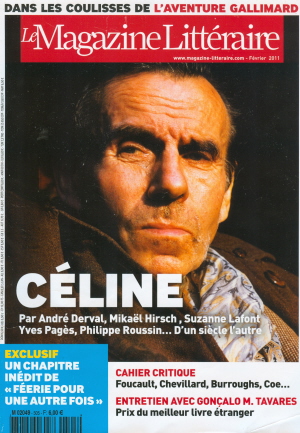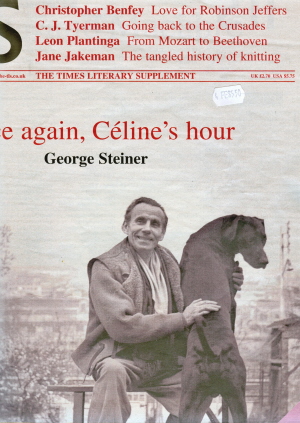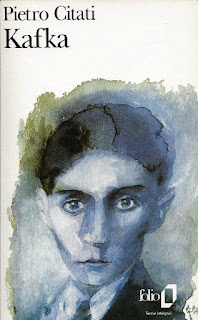Celine


GEORGE
STEINER
Celine
LETTERS
Edited by
Henri Godard and Jean-Paul Louis
2,034pp.
Gallimard. €66.50. 978207011604 I
Le Grand Macabre
The constant
voice of a pivotal writer in the history of the modern novel, who pours
out
inhuman tracts
Once again,
it is Celine's hour. As it was in the winter of 1932-3 when the Journey to the End of the Night exploded
- there is no other word - altering crucial aspects of the French
language and
of the compass of fiction in Western literatures. Books by and about
Celine
crowd the displays of Parisian bookstores. Re-editions, paperback
versions
teem. Reportedly, Sartre, whom Celine loathed for his political
opportunism and
second-hand philosophy and whom he savaged in À l'Agité du
bocal in 1945, declared not long before his own death,
"only one of us will endure: Celine". A verdict to be enlarged and
qualified by the realization, now a banality, that two bodies of work
lead into
the idiom and sensibility of twentieth-century narrative: that of
Celine and
that of Proust.
Ceine
professed contempt for Proust's "Franco- Yiddish", for his involutes
syntax and homosexual mendacities. He is "the Homer of the perverts".
In a letter to Lucien Combelle on February 12, 1943, Celine defines
Proust's
style as Talmudic: "Le Talmud est à peu près bâti, concu comme les
romans
de Proust, tortueux, arabescoide, mozaique desordonnée - ... Mais au
fond
infiniment tendancieux, passionnement, acharnément .... enrobage des
élites
pourries, nobiliaires, mondaines, inverties . . . en vue de leur
massacre. Epuration" (note the barbed punning
on "arab", on "Mosaic", and the use of epuration two years
before that term was to assume its murderous connotations). Celine
makes one
concession only:
Proust's
rendition of his grandmother, réussi
and justly marvelled at by "all Aryan critics". Celine senses that
the Recherche is his only true rival.
But as he informs Claude Gallimard (November 3, 1952), it is he,
Celine, and
not Proust who has inspired Joyce, Faulkner, Henry Miller, Jean Genet
and
lesser fry. All of "Midnight's children" were to be his.
In his
invaluable Dictionnaire Celine
(2004), Philippe Alméras lists twenty-seven different lives in one
protagonist.
Many of these have been studied and recounted. From the outset,
Louis-Ferdinand
Auguste Destouches is a traveler. The schoolboy visits England and
learns
English in which he will write letters. He is sent to Germany and
acquires a
halting familiarity with the the language. Conscripted in 1912, marechal de logis and cavalryman Destouches
is an unsparing witness to the ensuing catastrophe:
"II y a
une quantité énorme de viande et de sang répandu qui prête reflexions
amères". He is mesmerized by what he foresees as "the agony of the
German empire" and by the hell of combat. The severe wound that Celine
suffers on October 27, 1914, will affect him for life. Henceforth,
decorated
and partly maimed, he will define himself as a victim, invalidated in
body and
soul. Both the French nation and homicidal mankind owe him reparation.
Women,
beginning with the nurses in the army hospitals, are destined to look
after
him, to be pliant to his needs. In these, the erotic plays a complex
but often
marginal part. Disgust at those who elude military service, at
profiteers and
patriotic politicians, is boundless.
The first
"Celine" dicta begin to surface. 'J’ai horreur des Noirs";
"Certain beings are predestined to be slaves". Though outwardly
victorious, France faces a diminished and corrupt future. Having
studied
infectious diseases and public hygiene, qualifications that will lead
to a
distinguished thesis on Semmelweis, Destouches, as he still names
himself,
spends several years in French Equatorial Africa. His medical
activities
alternate with the supervision of cocoa plantations. His experiences
and the
letters in which he reports them are similar to those of Rimbaud in
Ethiopia.
The years that follow find Dr Destouches studying problems of public
health on
behalf of the League of Nations, missions which take him to Geneva and
the
United States, where he falls in love with Elizabeth Craig, the first
of many
dancers who will people his volcanic career. Women and ballet come to
crystallize Celine's ideal of lightness within action, within meaning.
If there
is a conventional bite of anti-Semitism in a letter of late October
1916 -
French literature is sentenced to being Jewish, which is to say
"morbid,
mercantile, hysterically patriotic" - there is at the same time an
attach ment
to the philosophy of Bergson. Far more emphatic is Celine's professed
detestation of marriage, his strident resolve to be alone.
Before long
he was at work on Voyage au bout de la nuit. Composition most probably
can be
dated as from the end of December 1929. Gallimard’s rejection of the
manuscript,
an editorial howler ironically parallel to its initial rejection of
Proust, and
the last minute failure of the leviathan to obtain the Prix Goncourt,
confirm
Celine's darkening misanthropy. "I rejoice only in the grotesque and at
the frontiers of Death." But his certitude as to the stature and future
of
his book lever wavers. It is "une oeuvre sans pareille" and "the
great fresco of lyric populism" beyond anything in Zola. Its very
punctuation,
those famous dashes and exclamation marks, constitutes a revolutionary
act.
Sales, moreover, were mountainous.
Here, also,
Celine's clairvoyance is almost eerie. As early as April 1933, he
predicted that
Hitler would come to dominate Europe. 'Tomorrow all Europe will be
fascist and
Céline will be imprisoned." The prophecies become more graphic after a
visit to Berlin: “Il se prépare là-bas (et pour ici) d'autres
infections,
d'autres immondes diversions sadiques monstrueuses. Des peuples entiers
affamés
et masochistes". In order to prevail, Hitler would have to invade the
Ukraine. This in 1935. What Western statesman or political scientist,
what
Churchill or what Keynes displayed any comparable foresight? Céline's
comments
are like reasoned hallucinations. His insights into the "opaque
sloth" and terminal pathology of the European spirit remain haunting.
Glints of anti-Semitism persist, but are as yet fitful.
It was
during 1936, after Celine had found the USSR to be "an ignoble bluff',
that his Jew hatred became obsessive and nauseating. The Jews are
infecting the
world and will be victorious everywhere. New York is nothing but a
ghetto fuelled
by their plutocracy. Zola ,vas an Italian Jew in the pay of the Dreyfusards. Celine now begins spitting
out his loathsome "pamphlets" which are in fact interminable tracts
denouncing all Jews. It is they who brought on, and profited from, the
First World
War and the Bolshevik infamy. It is the Jews whose international
intrigues will
renew Armageddon and prevent that Franco-German entente which aone
could
safeguard Europe. "I am writing an abominably anti-Semitic book": Bagatelles pour un massacre. After which
there will be L'École des cadavres and
Beaux Draps. Quotation from any of these screeds is sickening. They
are the
pornography of hatred.
Philippe
Sollers, who has been writing enthusiastically about Celine since 1963,
knows
that these texts are "à la mesure, verbalement" of the mass murder
they invoke and will help generate. He poses the bewildering question:
how are
we to grasp the fact that Celine's deranged racism did not negate his
literary
genius? How can it be that Celine's nihilism "sous sa forme de
passionnalité
vociférante antisemite" produced masterpieces? A contradiction which a
case such as Ezra Pound's cracker-barrel attacks on Jews does not
parallel
(ugly and infantile as these are).
The sources
of Celine's mania remain somewhat obscure. Memories of his wartime
anguish had
become cancerous. The Jews were self-evidently implicated, an appalling
irony,
in the possibilities of a recurrent horror. "Rather Hitler than Blum"
was a slogan and sentiment shared by numerous Frenchmen. The descent of
Western
values into frenzied financial speculations, the adulation of the pure
and
applied sciences, the salient role of Jewish messianic instincts in
Marxist
socialism (some of whose therapeutic ideals he actually shared), warped
Celine's judgment still further. But even this witches' brew falls
short of an explanation.
The demonic derangement reaches deeper: "le fanatisme juif est total et
nous condamne à une mort d'espèce atroce, personnellement et
poétiquement
totale". Celine has come to abominate the human species. La
juiverie is not the bottom line:
"l'homme suffit!". But the
inextinguishable Jew somehow embodies the contagious vitality, the
pandemic of
the human species as a whole. As the acid witticism has it: "the Jew is
like other men but more so" (there will be echoes of this reading in
Sartre's essay on the Jewish question). Thus extermination may be the
only
logical conclusion.
Celine's
conduct during the Occupation was characteristically idiosyncratic. He
authorized the publication and reissue of his infamous tomes. Together
with
other literary collaborators he accepted an official invitation to
Berlin in
March 1942. His monomania worsened: Racine's plays Bérenice,
Esther and Athalie
are nothing but a "vehement apologia for la Juiverie".
Stendhal is manifestly a Jewish freemason.
Marx's Jadishness is preferable to Montaigne's (who may, possibly, have
had marranos antecedents). Even Maurras
turns out to be a crypto-Jew. Celine informs the fascist leader Doriot
that
Jews must be swept away like faeces. Simultaneously, Celine took no
part in
German-commandeered cultural displays or propaganda, and voiced private
disgust
at the fate of individual Jews and résistants
(who had quarters, of which he was perfectly aware, in his own
apartment
building).
These
antinomies climaxed in a scene which, if true, almost defies
imagination. At a
soiree in the German legation, he leaps to his feet and performs a
dazzling
imitation of the Fuhrer's voice and gestures, and instructs his
terrified hosts
that Hitler will lose the war because he is not anti-Semitic enough!
The
assembled dignitaries are said to have scattered in panic. This episode
exactly
counterpoints the grand macabre of Simone Weil's refusal of Catholic
baptism
because the Church of Rome was "still too Jewish".
Celine and
his wife fled Paris on June 17, 1944. After a spell at Petain's phantom
court
in Sigmaringen, they made their way through the charred apocalypse of
the
collapsing Reich, reaching Denmark in March 1945. The years there
proved
purgatorial. Celine's spell in prison was harsh, as were the
psychological and
material constraints during his enforced exile on the Baltic coast. At
every
stage, Celine fought like a cornered wild cat against the persistent
threat of
extradition to France where he had been sentenced in absentee and
would, he was
certain, have been executed like Brasillach or assassinated like his
fascist
publisher, Robert Denoel. Celine raged against the suppression of his
writings
and would-be piratical publishers. He sought to refute the howling
testimony of
his detractors. He denied any involvement in Nazi atrocities, and even
strove
to obscure his anti-Semitism. Gangsters, profiteers, masters of
ambiguity such
as Gide and Sartre were flourishing while he, Celine, infirm, gagged
and near
destitution, was being made it scapegoat for France's hypocritical
attempts to
lie its way out of defeat and self-betrayal.
The Lettres
de prison and the Lettres des annees noires
display
Celine's rhetoric at its most resourceful. Efforts at rehabilitation
began as
early as 1948. Very gradually, Celine's name could be mentioned without
automatic anathema. More or less covertly, some of his writings inched
their
way back into circulation. Amnesty came in April 1951. By July, the
Celines
were back in France. Now began the fierce struggle against continued
ostracism,
against the silence of retribution that stifled Celine's writings. His
demands
for republication, for objective critical recognition, became
clamorous. In
1956, the walls began to come down. The Voyage was issued in paperback,
proving
to be a revelation to younger readers and would-be imitators. Gallimard
announced that the Voyage and Mort a
credit would enter the Pleiade, a
consecration for which Celine had striven tirelessly. His status as a
"classic" was in sight.
It was
during these bitter years that Celine, isolated in Meudon, largely
sequestered
by contempt and organized oblivion, produced a trilogy of fact-fictions
which
towers in modern literature. D'un Chateau
l'autre, Nord and Rigodon match,
if they do not surpass,
the force, the stylistic mastery of the Voyage.
They contain scenes which, using the word with care can be qualified as
"Shakespearean".
Too deaf to hear the approaching RAF fighter, Petain strides along on
his morning
constitutional with seeming heroism and sovereign indifference to
danger. The
sleazy buffoons of his retinue, aware of the swooping plane, do not
know
whether they should scatter for their lives. We are in the realm of
Falstaff,
though darkened. Bébert, surely the most famous cat in
twentieth-century
letters, leaps from the northbound train in terror. The entire horizon
is that
of a city in flames. Celine bounds after his beloved pet, desperate for
rescue.
The episode rivals Dante's Inferno,
albeit with a touch of tenderness. Sollers entitles Celine "a
specialist
of Hell", one who in his own words knew death to be his "permanent
mental horizon". Rigodon is the
name of a quick-step dance, popular in the Baroque. Here Celine aims to
enact
that lightness and adroit elegance which had always drawn him to
ballet.
The old
Celine still hisses. Gallimard is "a ghetto of pédégaulloresistants".
He wishes to hear more about the negationnistes, the
deniers of the
Holocaust. The politics, the editorial practices, the books being
produced
around him are mostly garbage. But he is now confident that history
will place
him "between Rabelais and Dostoevsky". Celine completed Rigodon
on the very eve of his death on
July 1, 1961.
A major part
of Celine's correspondence has already been available. It includes his
letters
to the Nouvelle Revue Francaise and
his loyal supporter there, Roger Nimier, to his cherished translator
Marie
Canavaggia; to Albert Paraz, to Lucien Rebatet, to his lawyers in
Denmark and
France. Further letters have appeared in various memoires
and cahiers. The
Pleiade selection features all the editorial annotations and chrogical
material
emblematic of that monumentalizing imprint. Such voluminous erudition
would
both have exasperated and flattered Celine. His views on literary
scholarship were
less than amicable. The principles of inclusion are not altogether
clear when
so much has been previously published though often in truncated
versions.
Unlike Flaubert or Proust, Celine did not make works of art of his
letters. He
writes them as he breathes. The constant is his voice: argotic, raging,
derisive, imperious, and sometimes strangely gentle. As the editors
note, this
gentleness emerges most distinctly in the letters to the three most
important
women in his life. What takes shape across the 2,000 pages of this
collection
is a biography in motion, an inventory - both fascinating and repellent
- of
"works and days".
Nevertheless,
the obvious dilemma persists. Dr Destouches was a caring physician
devoted to
the poorest, most infirm of his patients. His love of animals, strays
included
became legend. Celine's Jew-hatred is monstrous. Indistinct analogies
lie to
hand Wagner's racism, Proust's resort to sadistic, voyeurism,
Heidegger's
engagement with Nazism, Sartre's mendacities in respect of Stalin and
Mao. Aesthetic,
philosophic eminence is no guarantor of humane liberalism. The Celine
case
differs. Here is a writer of decisive stature, pivotal in the history
of the
modern novel, who pours out inhuman tracts. These are couched in an
idiom whose
yawping vulgarity, whose infantile, scatological filth make quotation
emetic.
Inferences of some mode of schizophrenia are facile. At some level the
same
magma is churning in the dynamics of Voyage
au bout de la nuit and of Nord as
in the Bagatelles. The man of
incensed compassion summons the butcher. What memories begot this
amalgam?
"Je n'oublie pas. Mon délire part de là."
The Celine
case is, I believe, a singularity (Praise be.)

Comments
Post a Comment